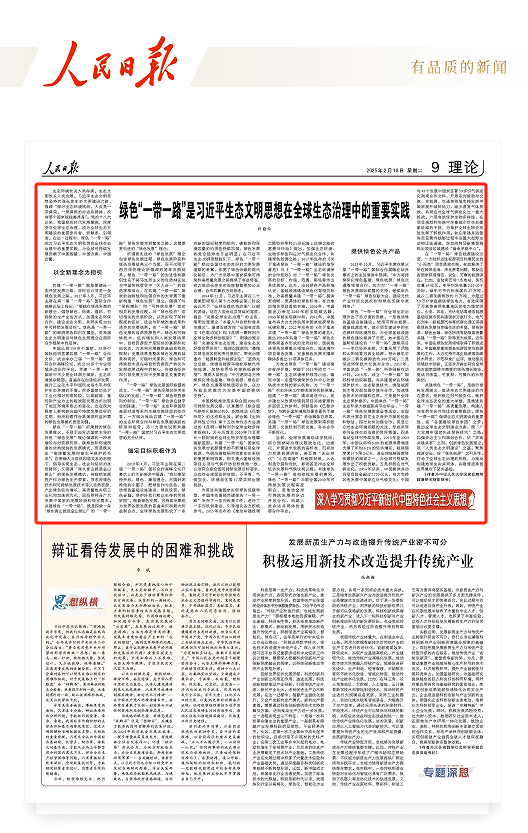 Research Update
Research Update
25
Feb
Xu Qinhua, Deputy Dean of the National Academy of Development and Strategy at Renmin University of China and Professor at the School of International Studies, published an article in People’s Daily titled “The Green Belt and Road is an Important Practice of Xi Jinping Thought on Ecological Civilization in Global Ecological Governance”. The key points of the article are as follows:
The article begins by clarifying the core essence of Xi Jinping Thought on Ecological Civilization and emphasizes the importance of building global ecological civilization. Since the 18th National Congress of the Communist Party of China, China has actively participated in global ecological governance and has become an important force in the construction of global ecological civilization. As a vivid practice of this thought, the Green Belt and Road initiative reflects China’s wisdom, solutions, and strength in promoting global sustainable development.
The article then points out that the Belt and Road Initiative is guided by a new concept. Green development is one of the core characteristics of Belt and Road construction and is closely related to China’s ecological civilization concept. The Green Belt and Road initiative differs from traditional “green development” models by emphasizing the organic integration of high-quality development and ecological protection, positioning green technologies and sustainable development technologies as the core drivers of economic growth. The concept of the Green Belt and Road combines Marxist dialectics of nature with China’s “unity of nature and man” philosophy, proposing that green development should encompass three aspects: process, stage, and result. This concept promotes a virtuous cycle of economy, society, and environment. Moreover, through a series of international cooperation platforms, it strengthens collaboration and exchange among countries in the field of green development, reflecting the recognition of Xi Jinping Thought on Ecological Civilization by the countries involved in the Belt and Road Initiative.
Next, the article highlights the importance of setting clear goals and taking proactive actions to advance the construction of a Green Belt and Road. As green development and sustainable development have become universal consensus and the greatest point of interest for countries around the world, global green governance is gradually forming new rules and trends. Currently, global development faces many challenges, with some countries politicizing and marginalizing governance issues, which impacts and even disrupts global economic development and the climate negotiation agenda. The construction of a Green Belt and Road is a model of inclusive development. The Green Belt and Road aligns closely with the United Nations 2030 Agenda for Sustainable Development and serves as an important cooperative platform for promoting global sustainable development, multilateral open cooperation, and building a shared future for humanity. Under Xi Jinping Thought on Ecological Civilization, China actively promotes the Green Belt and Road, advocating for a low-carbon transformation in line with sustainable development. It also proposes that global ecological governance should be based on the concept of harmony between humans and nature, aiming to drive energy transformation and energy security.
Finally, the article points out that the Green Belt and Road promotes global ecological governance in several ways: It facilitates the construction of green infrastructure, such as the China-Pakistan Economic Corridor project, which uses renewable energy to reduce carbon emissions. It strengthens environmental protection technology exchanges and promotes the application of green technologies. It enhances global ecological protection awareness and fosters international cooperation. It advances sustainable development, with China showing significant results in energy consumption and economic growth. It addresses climate change and supports developing countries in emission reduction. It protects biodiversity and reduces ecological disruption. Green energy projects have solved electricity issues, providing clean and secure energy.
China’s innovations and technological applications in green development have set an example for countries in the Global South, advancing the high-quality construction of the Belt and Road. The Green Belt and Road is not only an important initiative for building ecological civilization but also a key strategy for addressing climate change, ensuring global ecological security, and promoting sustainable development.
(Translated by ZHANG Yuqing; Proofread by YANG Fanxin)